|
On December 8th, the Solemnity of the Immaculate Conception of the Blessed Virgin Mary and the 150th anniversary of the proclamation of St. Joseph as patron of the universal church, Pope Francis proclaimed the Year of St. Joseph. To celebrate this historic moment in the universal Church, the Catholic Apostolate Center has launched a series exploring the depth and richness of fatherhood. We will feature one post a month from fathers at different stages of fatherhood, godfathers, spiritual fathers, priests, and grandfathers throughout the year. We invite you to join us this year in learning more about masculinity, fatherhood, the dignity of labor, and the importance of faithfulness to the will of God. As we continue in our life of faith, we invite St. Joseph to be a father to each one of us, guiding us ever closer to his adopted son, Jesus. May he teach us how to be faithful disciples constantly adoring the face of Christ. To kick off our fatherhood series, I’d like to share some powerful quotes from Pope Francis’ Apostolic Letter, Patris Corde, that will help us more deeply come to know the quiet carpenter who helped raise the Son of God. 1. “Each of us can discover in Joseph – the man who goes unnoticed, a daily, discreet and hidden presence – an intercessor, a support and a guide in times of trouble. Saint Joseph reminds us that those who appear hidden or in the shadows can play an incomparable role in the history of salvation.” Throughout salvation history, God has repeatedly chosen the least likely of candidates to accomplish his will. Moses was slow of speech. Peter was a fisherman. Paul was a persecutor of the Church. Joseph was a carpenter. What matters not to the Lord is our status in life, our accolades, our prestige, or our mightiness, but simply that we do His will. St. Joseph modeled that in every moment of his life—from accepting Mary into his home, to naming his Son Jesus, from fleeing to Egypt, to returning to Nazareth. St. Joseph, teach us obedience and humility. 2. “The greatness of Saint Joseph is that he was the spouse of Mary and the father of Jesus. In this way, he placed himself, in the words of Saint John Chrysostom, 'at the service of the entire plan of salvation.'[7]” Joseph was a father in every sense of the word. He guided and protected his family, provided for them, and loved them with tender affection. Everything he did was for the well-being of Mary and Jesus. He is a strong servant leader—one that all men can learn from. To be a father is a great blessing and gift. St. Joseph, help us to be servant leaders. 3. "Saint Paul VI pointed out that Joseph concretely expressed his fatherhood 'by making his life a sacrificial service to the mystery of the incarnation and its redemptive purpose. He employed his legal authority over the Holy Family to devote himself completely to them in his life and work. He turned his human vocation to domestic love into a superhuman oblation of himself, his heart and all his abilities, a love placed at the service of the Messiah who was growing to maturity in his home.'[8]" Just as faith without works is dead, so too is love devoid of service. St. Joseph did not love solely with his words, but by his actions—which is likely why Scripture does not recount any of his speech—with St. Joseph, there was no need. His entire life was a song of love for the Holy Family and for God. St. Joseph, teach us to love as you loved. 4. "Joseph saw Jesus grow daily 'in wisdom and in years and in divine and human favour' (Lk 2:52). As the Lord had done with Israel, so Joseph did with Jesus: he taught him to walk, taking him by the hand; he was for him like a father who raises an infant to his cheeks, bending down to him and feeding him (cf. Hos 11:3-4)." So often, we confuse holiness with otherworldliness. Perhaps we imagine celestial music, bright light, and the presence of angels accompanying the saints wherever they went. But to be holy is to be most fully human—at St. Iraneus said, “The glory of God is man most fully alive.” True holiness means living out our vocations fully, and that includes family life. St. Joseph would have fed Christ and eaten with him, he would have helped him get dressed or tied his sandals, he would have played games with him, sang with him, and worked with him. To be holy is not to be out of touch with reality. St. Joseph was not above the normal duties of fatherhood. St. Joseph, teach us to live out our vocations fully by taking Christ by the hand. 5. "Even through Joseph’s fears, God’s will, his history and his plan were at work. Joseph, then, teaches us that faith in God includes believing that he can work even through our fears, our frailties and our weaknesses. He also teaches us that amid the tempests of life, we must never be afraid to let the Lord steer our course. At times, we want to be in complete control, yet God always sees the bigger picture." A life of holiness does not mean one devoid of fear or suffering. This was true even for Joseph and Mary. What makes Joseph such a model for us is not that he was fearless, but that he trusted in God. He did many things that were difficult and probably not what he had intended for his life, but he trusted and obeyed. He hears the will of God and acts. Later on, Christ himself does not promise a life without the cross, but that He will always remain with us as we carry our crosses. It is when we give God our fears, frailties, and weaknesses that He can transfigure us for His glory. St. Joseph, teach us to trust God. 6. "During the hidden years in Nazareth, Jesus learned at the school of Joseph to do the will of the Father. That will was to be his daily food (cf. Jn 4:34)." The home of the Holy Family was a domestic church in which virtue flourished and sanctity was cultivated. As the head of the family, Joseph served as a priestly figure and an earthly shadow of God the Father. Joseph would have been a man of Scripture who obeyed God’s commandments and lived a life of authenticity and virtue. How beautiful it is to think that Jesus “learned at the school of Joseph.” St. Joseph, teach us to do the will of the Father. 7. "Just as God told Joseph: 'Son of David, do not be afraid!' (Mt 1:20), so he seems to tell us: 'Do not be afraid!' We need to set aside all anger and disappointment, and to embrace the way things are, even when they do not turn out as we wish. Not with mere resignation but with hope and courage. In this way, we become open to a deeper meaning. Our lives can be miraculously reborn if we find the courage to live them in accordance with the Gospel. It does not matter if everything seems to have gone wrong or some things can no longer be fixed. God can make flowers spring up from stony ground. Even if our heart condemns us, 'God is greater than our hearts, and he knows everything'(1 Jn 3:20)." The words of God to Joseph echo once more for us today: do not be afraid! Fear, stress, and confusion are all normal to the human condition. God is not asking us to erase these feelings from our lives, but to give them over to Him. He is calling us to abandon ourselves to His loving providence and not become imprisoned by these emotions. St. Joseph may have feared for his family’s safety and well-being, but he was not consumed by fear or paralyzed by doubt. Pope Francis calls him, “creatively courageous.” “In the face of difficulty,” he writes, “we can either give up and walk away, or somehow engage with it.” Joseph engaged. St. Joseph, teach us to abandon ourselves to God. 8. "Work is a means of participating in the work of salvation, an opportunity to hasten the coming of the Kingdom, to develop our talents and abilities, and to put them at the service of society and fraternal communion. It becomes an opportunity for the fulfilment not only of oneself, but also of that primary cell of society which is the family." Work is a part of God’s plan for humanity. What was not part of God’s plan was toil or fruitless labor that does not uphold mankind’s dignity. Prior to the Fall, Adam was called to till and cultivate the land. Christ has redeemed work once again by enabling us to offer all that we do and unite it to His sacrifice on the Cross. Our work can now have immeasurable meaning and be a means of sanctification. Joseph is also known as St. Joseph the Worker. He worked as a carpenter throughout his life and in this way provided for his family. When we work for others, when we work well and faithfully, our work can be a means of building up the Body of Christ and loving or serving one another. St. Joseph, teach us the dignity of human labor. 9. "Fathers are not born, but made. A man does not become a father simply by bringing a child into the world, but by taking up the responsibility to care for that child. Whenever a man accepts responsibility for the life of another, in some way he becomes a father to that person." Fatherhood is so much more than physical procreation. It involves the cultivation of family and of the human person. It means providing for the spiritual or physical well-being of others. For this reason, priests are also called “Father.” They represent our Heavenly Father and make manifest His graces poured out in the sacraments. They accompany us on our spiritual journeys and act as shepherds guiding us towards holiness. Godfathers, too, play an important role in society by serving as models of holiness for their godchildren and praying and interceding on their behalf. St. Joseph, teach men true masculinity and authentic fatherhood. 10. "The Church too needs fathers." Not only do families need fathers and stable father figures, the Church and world do as well. Authentic fatherhood is an essential part of God’s plan for humanity and is a part of God’s very identity. Society cannot exist and thrive without healthy and holy fathers. God chose to enter the world through a family and was obedient to his foster father Joseph while under his care. Scripture tells us that he "was obedient to them (Joseph and Mary).” St. Joseph, help raise up strong and loving fathers and father figures in our Church and society. As we journey together in the Year of St. Joseph, let us pray to this powerful intercessor using the prayer of Pope Francis, Hail, Guardian of the Redeemer, Spouse of the Blessed Virgin Mary. To you God entrusted his only Son; in you Mary placed her trust; with you Christ became man. Blessed Joseph, to us too, show yourself a father and guide us in the path of life. Obtain for us grace, mercy and courage, and defend us from every evil. Amen.
3 Comments
When I was in 8th grade, I helped teach for my parish’s religious education program and counted the hours toward my required community service time before receiving the Sacrament of Confirmation. I was an assistant for the 5th grade, and I thought it was the coolest thing. I could share with the class what I knew about the Church, even teaching them at one point how to pray the Rosary. Looking back, it seems like I was destined to teach in a Catholic school! After college, I began working at my current school in the Archdiocese of Washington (ADW), where I continue to teach and share my faith with the students. To this day, I continue to teach religion. I strive to form my students as disciples according to six elements of Catholic life: Knowledge of the Faith, Liturgy and Sacraments, Morality, Prayer, Education for Living in Christian Community, and Evangelization and Apostolic Life.
For catechists who actively pass on the Word of God to others, teaching the faith can become almost second nature. For instance, at my school, we incorporate core Jesuit principles into the curriculum each day and reflect on our own actions through prayer. In my pre-K classroom, we use these principles to talk about kindness and loving others as St. Ignatius taught. In a special way, my students are learning how to be good friends and love others the way Jesus did. In the Archdiocese of Washington (ADW), the religious curriculum has standards by which its content is measured and assessed—like any other subject area in school. In fact, ADW is trying to support catechists to do more to collaborate and keep kids engaged and excited about learning their faith. Professional development of catechists is crucial to a school, parish, or community. Learning how to be better witnesses of the faith ensures that our children are receiving the best formation of conscience they can get. Although there are people certified and educated to teach as catechists, most of us are already fulfilling that duty as faith-filled adults in the Church who witness to and spread the Gospel. Below is a list I have compiled of a description of a catechist. After reading it, do you feel called to become one?
For more information, we invite you to view the following webinar at the bottom of the page:
Question for Reflection: How can you teach the faith to others in your everyday life? *This post was originally published in May 2017* This Lenten season, I’m trying to be intentional with my prayer. In the Gospel today, Jesus teaches the disciples to pray the Our Father. When I read this passage to my students, they were really excited to make the connection to Jesus’ teaching and to a prayer some of them had heard before. Their little faces lit up and hands shot into the air to share about their experience with the Our Father.
In a 2016 homily, Pope Francis explained that the concept of “Father” in the Our Father is the cornerstone of prayer, for it gives us our identity as sons and daughters of God and as a family. Prayer is a way to connect with God, talk to him, and deepen our relationship with him. In prayer, Pope Francis said that if we do not begin “with ‘Father’ and with the awareness that we are children and that we have a Father who loves us and knows all of our needs,” we can sometimes find ourselves in our most vulnerable place: alone. It can be hard to be open and listen for God’s voice in the midst of worrying about ourselves and our concerns. This Lent, I invite you to use prayer to help deepen your understanding of your identity as the son or daughter of God and to put aside distractions and focus on Christ. In prayer, we can discover a deeper sense of self and of others. We can also take a moment to consider our failures and better understand God’s forgiveness. In the Our Father, we ask God to forgive us and pray that we can find strength to forgive others. That strength can be found in the Sacrament of Reconciliation and in making amends to those whom we have wronged. This deepens our relationship with God and with others. Pope Francis continued, “If you go to pray and say only ‘Father’, thinking of the One who gave you life, who gives you your identity and loves you, and you say ‘our’, forgiving everyone, forgetting offences: this is the best prayer that you can make”. Throughout Lent, I want to deepen my prayer life and model for my students and my husband that God is truly at the center of my life. During Lent, I’d like to challenge myself to sit in the chapel some mornings before school starts and pray in silence before God. I’d also like to plan my morning around a daily Mass. Throughout Lent, I will look to the Our Father as a centering and reflective prayer. Jesus taught us to pray with it, and I intend to use these simple but transformative words to guide my life. Just as my students continue to learn about prayer, I too will continue to allow myself a chance to start over and prepare my heart for God’s love this Lent. As we continue on our Lenten journey, I invite you to reflect on the following questions asked by Pope Francis in his homily: “Do I see God as Father, do I feel that He is my Father? And if I do not feel that He is, do I ask the Holy Spirit to teach me to know this? Am I capable of forgetting offences, of forgiving, of letting things go and asking the Father: ‘they are also your children, and they treated me badly, please help me to forgive?” For more Lenten and Easter resources, please click here. When I was in 8th grade, I helped teach for my parish’s religious education program and counted the hours toward my required community service time before receiving the Sacrament of Confirmation. I was an assistant for the 5th grade, and I thought it was the coolest thing. I could share with the class what I knew about the Church, even teaching them at one point how to pray the Rosary. Looking back, it seems like I was destined to teach in a Catholic school! After college, I began working at my current school in the Archdiocese of Washington (ADW), where I continue to teach and share my faith with the students. To this day, I continue to teach religion. I strive to form my students as disciples according to six elements of Catholic life: Knowledge of the Faith, Liturgy and Sacraments, Morality, Prayer, Education for Living in Christian Community, and Evangelization and Apostolic Life.
For catechists who actively pass on the Word of God to others, teaching the faith can become almost second nature. For instance, at my school, we incorporate core Jesuit principles into the curriculum each day and reflect on our own actions through prayer. In my pre-K classroom, we use these principles to talk about kindness and loving others as St. Ignatius taught. In a special way, my students are learning how to be good friends and love others the way Jesus did. In the Archdiocese of Washington (ADW), the religious curriculum has standards by which its content is measured and assessed—like any other subject area in school. In fact, ADW is trying to support catechists to do more to collaborate and keep kids engaged and excited about learning their faith. Professional development of catechists is crucial to a school, parish, or community. Learning how to be better witnesses of the faith ensures that our children are receiving the best formation of conscience they can get. Although there are people certified and educated to teach as catechists, most of us are already fulfilling that duty as faith-filled adults in the Church who witness to and spread the Gospel. Below is a list I have compiled of a description of a catechist. After reading it, do you feel called to become one?
For more information, we invite you to view the following webinar at the bottom of the page:
Question for Reflection: How can you teach the faith to others in your everyday life? When I was in 8th grade, I helped teach for my parish’s religious education program and counted the hours toward my required community service time before receiving the Sacrament of Confirmation. I was an assistant for the 5th grade, and I thought it was the coolest thing. I could share with the class what I knew about the Church, even teaching them at one point how to pray the Rosary. Looking back, it seems like I was destined to teach in a Catholic school! After college, I began working at my current school in the Archdiocese of Washington (ADW), where I continue to teach and share my faith with the students. To this day, I continue to teach religion. I strive to form my students as disciples according to six elements of Catholic life: Knowledge of the Faith, Liturgy and Sacraments, Morality, Prayer, Education for Living in Christian Community, and Evangelization and Apostolic Life.
For catechists who actively pass on the Word of God to others, teaching the faith can become almost second nature. For instance, at my school, we incorporate core Jesuit principles into the curriculum each day and reflect on our own actions through prayer. In my pre-K classroom, we use these principles to talk about kindness and loving others as St. Ignatius taught. In a special way, my students are learning how to be good friends and love others the way Jesus did. In the Archdiocese of Washington (ADW), the religious curriculum has standards by which its content is measured and assessed—like any other subject area in school. In fact, ADW is trying to support catechists to do more to collaborate and keep kids engaged and excited about learning their faith. Professional development of catechists is crucial to a school, parish, or community. Learning how to be better witnesses of the faith ensures that our children are receiving the best formation of conscience they can get. Although there are people certified and educated to teach as catechists, most of us are already fulfilling that duty as faith-filled adults in the Church who witness to and spread the Gospel. Below is a list I have compiled of a description of a catechist. After reading it, do you feel called to become one?
For more information, we invite you to view the following webinar at the bottom of the page:
Question for Reflection: How can you teach the faith to others in your everyday life? Today we are re-posting a blog from our archives on the many ways we can use prayer to communicate with God. Consider adopting one of these forms of prayer into your weekly routine as you strive to strengthen your relationship with the Lord.
10/8/2015 In a classroom of 25 students, sometimes it gets a little noisy. Just simply saying, “In the name of the Father, and of the Son…” in my Catholic school can quiet a room faster than the loudest bell or my scariest tone of voice. Students can begin the day with prayer, end it with prayer, and say it before meals. However, prayer in a student’s life can come in many forms. Rejoice always, pray continually, give thanks in all circumstances; for this is God’s will for you in Christ Jesus. (1 Thes 5:16-18) In my school, we try and encourage our students to “find God in all things.” This is a beautiful way to appreciate God’s creation and look for Him throughout our lives in the people we meet, places we go, and in everything we do. For second graders, these moments of thankfulness can be tricky to find, but when they discover that it can be as easy as thinking, “Thank you God for the opportunity to be in school today and learn about volcanoes,” the difficulty fades away. Then you will call on me and come and pray to me, and I will listen to you. (Jer 29:12) Another form of prayer I use in my classroom is silent reflection. Responses vary from boredom to feeling peace. I remind the children that prayer is a chance to talk to God about something or sit in the silence and listen for God talk to them. This quiet peace is what helps us reinvigorate our afternoons for more learning! This is the confidence we have in approaching God: that if we ask anything according to his will, he hears us. (1 John 5:14) Recently, journaling has been my students’ favorite form of prayer. We handed out small prayer journals so that each student could write prayers from the heart to God. Letting them know their writing is private and personal was a crucial part to helping them understand that prayer can be an intimate conversation with the Lord about anything and everything. Children learn about prayer from those closest to them, so for those who have children, I challenge you: be a role model in prayer. Take just a few moments in a day, especially with your child, and pray. ■ The Lord’s Prayer is a good place to start if you don’t know what to say! ■ The Rosary is a beautiful way to ask Mother Mary to intercede for us on a regular basis. ■ The Serenity Prayer is a lifesaver for me sometimes, it helps me think about what things in life I can change and what things I cannot solve! It is a truly beautiful prayer to memorize. My students may not realize it now, but one day (hopefully soon) this whole “prayer thing” may click for them. All the eye-rolling and goofing-around may one day stop. If only for a moment, my second graders may actually feel the presence of God. For a moment, they might believe God is answering a prayer request they made. They may earnestly thank the Lord for the day they’ve just had. These many forms of prayer that are presented to them throughout the day may click, hopefully in such a way that they might even try to pray on their own. For more resources on Prayer and Catechesis, please visit http://www.catholicapostolatecenter.org/prayer--catechesis.html. Originally published on 10/8/2015. “The word of God nourishes both evangelizers and those who are being evangelized so that each one may continue to grow in his or her Christian life” – National Directory of Catechesis Over the last 40 years, the United States Conference of Catholic Bishops (USCCB) has especially recognized the importance of catechists in the process of evangelization by reserving the third Sunday in September as “Catechetical Sunday.” Catechetical Sunday commemorates and celebrates the ministry of formal catechesis, which is the systematic teaching of the tenets of the Catholic faith in order to help others know more about God and his Church. This ministry has had a significant role in my life over the past four years and across two different dioceses. There is something amazing about trying to explain the Old Testament prophets to a group of 6th grade students, a majority of whom has never heard the likes of Jeremiah, Isaiah, Elijah, etc. I love seeing the excited faces of students that either know or are interested in the subject of my teaching, while the blank ones challenge me to find compelling ways to make the faith a living part of their lives. On Catechetical Sunday, parishes, including where I have served, have a particular ritual: before the recessional at the end of Mass, the celebrant asks all who are called to serve as catechists to stand and receive a blessing for their work throughout the year. This serves two purposes: it helps the catechist understand the importance of their teaching role in the parish and also serves as a moment of reflection for the rest of the congregation. The influence of a catechist on a young life cannot be understated. Below are a few tips I’ve learned throughout my time as a catechist that can help those interested in pursuing the ministry of catechetical formation.
Catechetical Sunday reminds us of our individual roles in the evangelization of the baptized. In our small way, my fellow catechists and I—men and women from all walks of life and individual faith journeys—try to sow the fruits of faith for the next generation of disciples. Pulling from my toolkit, I will leave you with a blessing for catechists: “Lord God, source of all wisdom and knowledge, you sent your Son, Jesus Christ, to live among us and to proclaim his message of faith, hope, and love to all nations. In your goodness bless our brothers and sisters who have offered themselves as catechists for your Church. Strengthen them with your gifts, that they may teach by word and by example the truth that comes from you.”
I still remember as if it were yesterday. There I was—a junior in high school with my sights set on my then life’s goal of playing college soccer—listening to the doctor tell me the results of the recent X-ray: “You have a stress fracture in your left ankle.” My heart sank, and I immediately focused on the most apparent, inevitable consequence of that injury: I would have to sit out the whole season, meaning I would miss crucial recruiting opportunities. To say the least, I was discouraged as I stood before the rather large and ominous mountain that so suddenly impeded the pursuit of my goal. I instantly began feeling sorry for myself and let anger creep into my heart. Then, in what I now look back upon and gratefully remember as “the moment of mercy,” I heard God’s gentle voice speak to the depths of my heart and tell me, “Carolyn, there’s more to life than soccer.” With my heart pierced by that voice, my desire to play college soccer disappeared. I soon began making decisions that would lead me to the people and places that God had in mind for me to more deeply encounter His mercy and to discover the actual goal of my life. During my first year of college, the Lord sent a spiritual director into my life who asked me a life-changing question: “Carolyn, what is the goal of your life?” At that time, I couldn’t honestly answer, since I couldn’t yet put into words what the Lord had begun stirring in my heart through the stress fracture event. Yet, over the next few years of college as I continued spiritual direction and developed a more habitual prayer and sacramental life, the Lord began to show me the answer to the question: Communion with God—holiness—is the goal of my life, because Love is the meaning of life. In a special way during this Jubilee Year of Mercy, the Church is called to be “a living sign of the Father’s love in the world” (Misericordiae Vultus 4). At the heart of the Jubilee Year of Mercy, we find the Person of God the Father, whose love is both the origin and goal of our life. The Year of Mercy is a special time of grace in the Church, and Jesus invites us to daily re-encounter our Heavenly Father, to be renewed by His love—which alone gives meaning to our life—and to joyfully share the gift of His love with those whom the Lord entrusts to us each day. At a General Audience on December 9, 2015 (the day after the opening of the Year of Mercy), Pope Francis emphasized the purpose of the Jubilee Year: Turning our gaze to God, our merciful Father, and to our brothers and sisters in need of mercy, means focusing our attention on the essential contents of the Gospel: Jesus, Mercy made flesh, who renders the great mystery of the Trinitary Love of God visible to our eyes. Celebrating a Jubilee of Mercy is equivalent to placing once again the specific nature of the Christian faith, namely Jesus Christ, the merciful God, at the center of our personal life and that of our communities. In other words, Pope Francis is saying that the invitation during this Jubilee Year of Mercy is to “return to the basics” of our faith: to enter more deeply into the mystery of the Holy Trinity, which is “the central mystery of Christian faith and life” (CCC 234). In fact, Pope Francis begins his letter for the Jubilee Year with words which aim to “sum up the mystery of the Christian faith”, namely, that “Jesus Christ is the face of the Father’s mercy” (Misericordiae Vultus 1). Jesus’ whole earthly mission was to reveal the truth about God’s inner life of love and man’s vocation to that love that originates from the Father’s heart (John 17:3; CCC 514-518). This is why Jesus tells Philip, “He who has seen me has seen the Father” (John 14:9). Everything Jesus says and does reveals the Father (CCC 516) and aims at “restoring fallen man to his original vocation” (CCC 518) of love. Thus, the Jubilee Year of Mercy is a special moment of grace to daily re-orient the gaze of our hearts towards the merciful gaze of the Father that tenderly awaits us. This gentle and loving gaze of the Father reveals the love that alone is the origin, goal, and meaning of our life. As Pope Saint John Paul II says, “Man and man’s lofty calling are revealed in Christ through the revelation of the mystery of the Father and His love” (Dives in misericordia 1). May we live this Jubilee Year by creating the space in our daily lives—particularly through prayer and frequent reception of the Sacraments—to encounter Jesus and to let our merciful Father love us. We ask Mary, Mother of Mercy, to help us open our hearts and be more receptive to the Father’s love. May we give her permission to use us as instruments of God’s mercy in the lives of others so that we can share the gift of His love with those whom God entrusts to us. On Sunday, we celebrate fathers. When I was young, my three siblings and I would use this day to thank our dad by giving him a few things he loved. We would let him sleep-in, make a full breakfast (sometimes corn muffins with icing writing) with a new “#1 Dad” mug each year, give him the cards we had made, go to Church as a family, pray the Memorare prayer to St. Joseph, and then leave him to fall asleep watching the NASCAR race on the couch (and not even change the channel while he was sleeping). It was a great day to make my dad feel appreciated. Since I moved away from home, I still try to celebrate Father’s Day by sending a card or two, giving my dad a phone call, and keeping in touch. Most importantly, I have realized that my dad has taught me three important lessons about life: to always keep your head up, that family will always be there for you, and that a Catholic should live in service to the community and with faith in God. In thinking about my dad’s example, I can’t help but feel that his life also modeled that of St. Joseph, the foster father of Jesus.
I’m pretty optimistic, and I get it from my dad. He has a thing about quoting movies. Some of his favorite lines are Dory’s “Just keep swimming, Just keep swimming” from Finding Nemo and The Lion King’s “Hakuna Matata.” During challenging times in my family, silly reminders like these helped teach my siblings and me about perseverance and keeping a smile on our faces. Even now, I use these phrases as mottos and words to live by, and have been able to pass along a similar optimism to the students I teach and my own friends. My dad also taught me about love and support with family. He was the one to encourage my siblings and me to be nice to each other, reminding us, “You’re going to want to keep in touch with each other, because one day you might actually be able to stand one another.” Turns out, he was right. Three of the four of us live in Washington, D.C. and appreciate each others’ company more than ever. St. Joseph also modeled a steadfast commitment to family, even in the midst of hardship. He remained loyal to Mary in their betrothal after finding out she was with child; he guided the expectant Mary into Bethlehem and took care of her despite not finding room at an inn; and Joseph led the Holy Family into Egypt for safety as a result of the persecution implemented by King Herod. The final lesson to consider is my dad’s faith and devotion to the Gospel. When I was young, he would start the day by praying with the family through a passage in either the New Testament or the Psalms and say an “Our Father” together before leaving to teach for the day. My dad has always been big on service and helping others, too. He was the one to initiate the Kirby’s into parish hospitality and we began to run a monthly “coffee hour” where we would serve coffee and doughnuts to our fellow parishioners. Around this same time, he also became a city councilor to further help the community. Through his faith and commitment to service, my dad reminds me of St. Joseph. My dad’s continued positivity, the prioritization of our family in his life, and his life of faith and service model the life of the foster father of Jesus. The Memorare of St Joseph was prayed on Father’s Day in my house growing up: “Remember, O most pure spouse of the Virgin Mary, my beloved Patron, that never it has been heard that anyone invoked your patronage and sought our aid without being comforted. Inspired by this confidence I come to you and fervently commend myself to you. Despise not my petition, O dearest foster father of our redeemer, but accept it graciously. Amen.” St. Joseph, patron of fathers and workers, was a humble man who said “yes” to God. After finding out that his betrothed was pregnant with God’s son, St. Joseph continued to protect and care for his family, knowing that there would be hardships and danger in the future. Although not much is written about St. Joseph besides what is in the Gospels, he is remembered for his commitment to Mary and Jesus and his simply-humble nature. As we celebrate Father’s Day this Sunday, we can remember St. Joseph in prayer and thank him for his respectful obedience in service to God’s plan in our lives though faith, service, and focus on the family. "In light of Father’s Day, I have been reflecting on how the Father cares for his children, and how we can understand God’s fatherhood."
“… You, oh Lord, are our Father…” (Is 63:16) During an especially difficult time of transition in my life, I became very bratty with God. As in, I whined to God the Father, and was very spiritually dramatic. “Abba! Daddy!,” I screamed, “What are You doing with my life? What is going on?” The short answer: taking care of me. The long answer: taking care of me in ways I haven’t even begun to realize. In light of Father’s Day, I have been reflecting on how the Father cares for his children, and how we can understand God’s fatherhood. We live in an age characterized by fatherlessness. Personally, I don’t have the best relationship with my earthly father, and neither do many of my peers. This can sometimes damage our view of God the Father. Does the Father really love me? Does He like me? These and other questions can plague our spiritual lives as we seek to understand our roles and vocations in life. Someone somewhere along the way told me the Father loves me, and I believed them. But I have also wondered what that means. What does it mean to be taken care of by a good father? What does a good father look like? What role does spiritual fatherhood play in this age? To get some answers, I grabbed a few books. I also bribed my pastor with brunch one Saturday and asked him. The Catechism of the Catholic Church, in paragraph 2223, states that parents are responsible for “creating a home where tenderness, forgiveness, respect, fidelity, and disinterested service are the rule. The home is well suited for education in the virtues. This requires an apprenticeship in self-denial, sound judgment, and self-mastery - the preconditions of all true freedom.” The Catechism says parents, not just the mother or the father, but both create the home. How often in sit-coms, movies, or advertising do we see dads being labeled as irresponsible buffoons who can’t take care of their children or run a household without impending disaster? How often do we hear, jokingly of course, that a woman’s husband is her biggest kid, implying that she has to take care of him as if he can’t care for himself and others? In my conversation with my pastor, Fr. Michael, he pointed out the similarities and differences of biological and spiritual fatherhood. A spiritual father can never replace and cannot be as close as a biological father because the community a priest serves is diverse and varied. Human fatherhood, both biological and spiritual, is for the sake of directing children to depend upon God the Father. In other words, they are to train their children to not need them anymore. Fatherhood is meant to be a pilgrimage of surrender, directing the lives of their children to see that God has been working in their lives and caring for them all along. While a father will always be there for his children, praying for and supporting them, his mission is to train them to see God the Father for who he is and to be receptive to the Father’s love and his will for their lives. Fr. Michael said fatherhood should be approached with awe and gratitude and humility because God the Father is allowing a fallen human man to participate in his mission of loving his people, and this man might get it wrong. People fail. It happens. Even the best of fathers and priests and popes make mistakes. There was a reason Pope St. John Paul II went to confession every week. (What was he confessing? We don’t know. But clearly it helped him love us better.) The parable of the prodigal son could also be called the parable of the patient father. He longs for our hearts to be united to his heart, whether we are the faithful older son or the rebellious younger son. There is a place for each of us in our father’s house. No matter how petulant, rude, or down-right bratty we are with him, our Father loves us and cares for us. He will not fail us, even if we have no idea what his will is during a moment of turbulence. In my 2nd grade class, the students are preparing to celebrate First Eucharist. They are busy learning all they can about their Catholic faith, the parts of the Mass, prayers and responses, forgiveness and preparing their hearts, and most of all: about the Eucharist itself. They are beginning to understand the purpose behind the Mass and why we say certain responses and kneel or genuflect at particular times. My class was recently interviewed by a couple of 8th graders about expectations they have for receiving First Communion. Some responses were priceless, such as:
“I’m nervous to forget to say, AMEN” and “I’m afraid to drop the host.” There were more practical answers such as: “I am excited to eat in church” and “I’m nervous to have 5,000 eyes on me!” My students are still learning, and during this time of preparation, I want to be sure they understand how they can reach intimacy with Christ in the Eucharist. With the Easter Triduum beginning on Thursday at the Last Supper, there is no better time than now to focus on the Eucharist. In both the Gospel of Luke and the Gospel of Matthew, we learn about the Last Supper Jesus had with his disciples. Luke 22:19 says, “And he took bread, gave thanks and broke it, and gave it to them, saying, ‘This is my body given for you; do this in remembrance of me.’” In Matthew 26:27-29, the Lord says something similar when he blesses the cup saying, “...and when he had given thanks, he gave it to them, saying, ‘Drink from it, all of you. This is my blood of the covenant, which is poured out for many for the forgiveness of sins.” We learn and believe that in this highest moment of Mass, in transubstantiation, the bread and wine transform into the Body and Blood of Christ. As I teach my students about the Eucharist, this consecration is the pinnacle moment that they must learn about and understand.The consecration in the context of the Last Supper is something we can all look forward to on Thursday. As Lent draws to a close and the Triduum begins, how prepared are we? My class’s preparation includes the preparation of their hearts through reconciliation. We go to confession as a class at the beginning of Lent, relieving ourselves of the pain and sins we have weighing us down. As we draw nearer to Easter, it is through this penance that we can see God more clearly, grow in intimacy with him, and be ready to receive Christ in the Eucharist. I invite you to consider going to confession before Easter. Although my 2nd graders will continue to learn about their faith and the Eucharist throughout their whole lives, my hope is to prepare them well-enough to make their First Communion as meaningful as possible. Part of this preparation is encouraging personal prayer for these youngsters. As a class, we are beginning to use more and more prayers for specific times in the day. We pray in gratitude or practice intercession. Loyola Press offers an Ignatian Examen for reflection each day that has a variety of topics and purposes. They are all calming and peaceful, with background music and an ending prayer. The Hail Mary, the Our Father, or the Glory Be help us learn more about how Jesus taught us to pray and other traditional Catholic prayers to know by heart. We also have personal prayer, taking quiet time to talk to God and ask him for help or to give strength to someone in pain. Finally, we will be learning a Communion prayer as we get closer to April and May to prepare the class to receive Christ for the first time. My Communion Prayer Dear God, I know that You give me many gifts. The gift of Your Son, Jesus Christ in Holy Communion is the greatest of all. How can I ever thank You enough for this special gift? At Mass we are called to be like Jesus, by loving and serving one another in the world. As I become more like Him, please continue to help me. Show me the places and ways that I can bring Your love, kindness, and peace to others.... in my family, in my neighborhood, in my community, with my friends. (Moment of silent reflection) Amen. Teaching 2nd grade religion has taught me more about my faith than I ever thought was possible. Now, I urge you to use these last few days of Lent and the Triduum to use prayer and penance to grow in closeness to God through the Eucharist. Like one of my students said, “I can’t wait to get communion because then I’m totally part of Mass and I don’t have to just be blessed with my arms crossed.” In a classroom of 25 students, sometimes it gets a little noisy. Just simply saying, “In the name of the Father, and of the Son…” in my Catholic school can quiet a room faster than the loudest bell or my scariest tone of voice. Students can begin the day with prayer, end it with prayer, and say it before meals. However, prayer in a student’s life can come in many forms.
Rejoice always, pray continually, give thanks in all circumstances; for this is God’s will for you in Christ Jesus. (1 Thes 5:16-18) In my school, we try and encourage our students to “find God in all things.” This is a beautiful way to appreciate God’s creation and look for Him throughout our lives in the people we meet, places we go, and in everything we do. For second graders, these moments of thankfulness can be tricky to find, but when they discover that it can be as easy as thinking, “Thank you God for the opportunity to be in school today and learn about volcanoes,” the difficulty fades away. Then you will call on me and come and pray to me, and I will listen to you. (Jer 29:12) Another form of prayer I use in my classroom is silent reflection. Responses vary from boredom to feeling peace. I remind the children that prayer is a chance to talk to God about something or sit in the silence and listen for God talk to them. This quiet peace is what helps us reinvigorate our afternoons for more learning! This is the confidence we have in approaching God: that if we ask anything according to his will, he hears us. (1 John 5:14) Recently, journaling has been my students’ favorite form of prayer. We handed out small prayer journals so that each student could write prayers from the heart to God. Letting them know their writing is private and personal was a crucial part to helping them understand that prayer can be an intimate conversation with the Lord about anything and everything. Children learn about prayer from those closest to them, so for those who have children, I challenge you: be a role model in prayer. Take just a few moments in a day, especially with your child, and pray. ■ The Lord’s Prayer is a good place to start if you don’t know what to say! ■ The Rosary is a beautiful way to ask Mother Mary to intercede for us on a regular basis. ■ The Serenity Prayer is a lifesaver for me sometimes, it helps me think about what things in life I can change and what things I cannot solve! It is a truly beautiful prayer to memorize. My students may not realize it now, but one day (hopefully soon) this whole “prayer thing” may click for them. All the eye-rolling and goofing-around may one day stop. If only for a moment, my second graders may actually feel the presence of God. For a moment, they might believe God is answering a prayer request they made. They may earnestly thank the Lord for the day they’ve just had. These many forms of prayer that are presented to them throughout the day may click, hopefully in such a way that they might even try to pray on their own. For more resources on Prayer and Catechesis, please visit http://www.catholicapostolatecenter.org/prayer--catechesis.html. “Saint Thomas Aquinas, pray for us.” This simple invocation was the conclusion to my family’s Morning Prayer ritual. Every morning, for as long as I can remember, my family would pray together an Our Father, Hail Mary, Glory Be, and the St. Michael’s Prayer. We would conclude with the invocations of Saint Anthony (for a safe trip to school) and Saint Thomas Aquinas (for help with our studies). Today the day before the feast day of Saint Thomas, patron saint of students, and during Catholic Schools Week; I wanted to share my experience of education.
I attended public schools from first grade until I graduated from high school. I was not the only religious student in my grade (or even the only Catholic) but nonetheless I was labeled as the “token Catholic.” This label was at times a point of pride for me and at others a burden I wish I could evade. While it never hindered me from making friends, it still set me apart. I would take up defense of the Church’s often unpopular stance on social issues in class discussions. In some rare cases I even found that my thoughts on certain subjects were brushed off as being my opinion only because of my faith, and any evidence I supplied in support of that stance was ignored. While I received a well-rounded education, the school community was so concerned with being tolerant of all things that it became intolerant of ideas it perceived as being intolerant. After high school, I attended a Catholic college. This was my first real experience of having faith integrated into my formal education. There were numerous differences, but perhaps the most notable was the community. In every classroom, there were Catholic students whose beliefs varied widely, as well as students of other faiths or no faith at all. Regardless of who you were or what you believed, you were expected to support your opinion with reason. It was this environment that fostered a community of intellectual discussion and debate (which rarely turned into conflict). Every idea was heard, which allowed me to hone my own beliefs while also growing in faith. This community was truly welcoming and challenging to all—even when that meant a difference of opinions. Education should be a constant exchange of ideas. This exchange is not always smooth and simple, and that can in fact be a good thing. Saint Thomas’s two greatest works, Summa Theologica and Summa Contra Gentiles, incorporate the work of the Greek philosopher Aristotle (which, at the time that Saint Thomas lived and wrote, was just shy of heresy). He also conversed with philosophers of other faiths, most notably Islam. Despite this pushing of boundaries—or perhaps because of them—Saint Thomas is recognized today as one of the founders of modern philosophy. In his writings he addresses arguments and opposition to his theories head-on regardless of whom they came from. This boldness in spirit is what made him both an incredible student and teacher. It is also why, over eight hundred years later students—myself certainly included—ask for his intercession with their studies. As Catholics, it is our duty to build up communities where we can encounter both those who share our faith and those who do not. We can see this lived out in the challenging and formative words of our Holy Father. May we always seek to be students and teachers of the faith. Saint Thomas Aquinas, pray for us. Patrick Burke is a staff member at The Catholic University of America in Washington, D.C. “Jesus said to his disciples: ‘Suppose one of you has a friend to whom he goes at midnight and says ‘Friend, lend me three loaves of bread, for a friend of mine has arrived at my house from a journey and I have nothing to offer him,’ and he says in reply from within, ‘Do not bother me; the door has already been locked and my children and I are already in bed. I cannot get up to get you anything.’ I tell you, if he does not get up to give him the loaves because of their friendship, he will get up to give him whatever he needs because of his persistence. And I tell you, ask and you will receive; seek and you will find; knock and the door will be opened to you. For everyone who asks, receives; and the one who seeks, finds; and to the one who knocks, the door will be opened. What father among you would hand his son a snake when he asks for a fish? Or hand him a scorpion when he asks for an egg? If you then, who are wicked, know how to give good gifts to your children, how much more will the Father in heaven give the Holy Spirit to those who ask him?”
The friend in Jesus’ parable is persistent in asking for bread. He did not immediately give up when it seemed that the answer was no. He kept asking until his friend gave him what he needed. Just as the friend did not give up, we should be persistent as well. Instead of simply saying a Hail Mary or an Our Father and then calling it a day, it is important to persevere in prayer. For the intentions that are closest to your heart, remember to pray without ceasing. It has been said that Saint Monica prayed for the conversion of Saint Augustine for thirty years. She refused to give up when all signs seemed to indicate that her prayer went unheard! In reality, God heard her prayer and helped her son to become a great saint in heaven. Just as a little child feels safe running to his father when he needs something, Jesus invites us to treat God the Father the same way. All fathers who love their children want what is best for them. God, our heavenly Father, is no different, except his love for his children is infinitely more perfect. He wants you to spend eternity with him in Heaven. He wants to give you the graces that you need to get there, if only you ask for them. Jesus has made us a magnificent promise! “Ask and you will receive.” Although your prayers may not be answered exactly as you expect, God does promise his children something even better: the Holy Spirit! The gifts of the Holy Spirit are yours for the taking. All you have to do is ask and be persistent asking. Jennifer Beckmann is an Administrative Secretary for the United States Conference of Catholic Bishops Secretariat for Evangelization and Catechesis. |
Details
Archives
July 2024
Categories
All
|
About |
Media |
© COPYRIGHT 2024 | ALL RIGHTS RESERVED

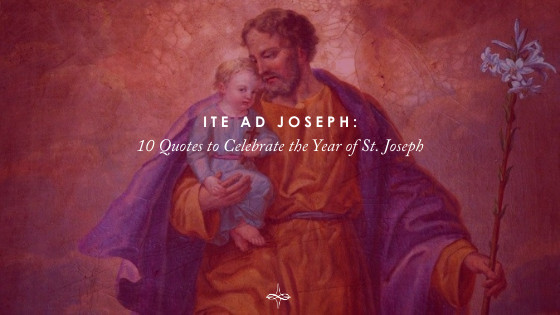

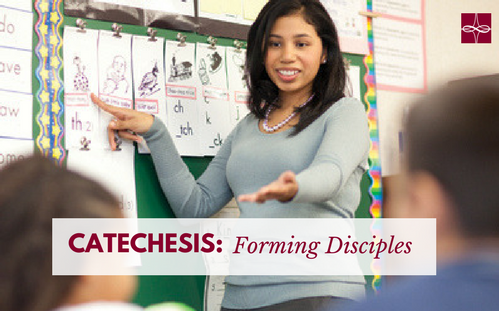



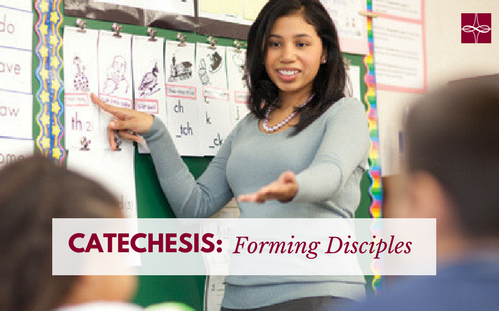

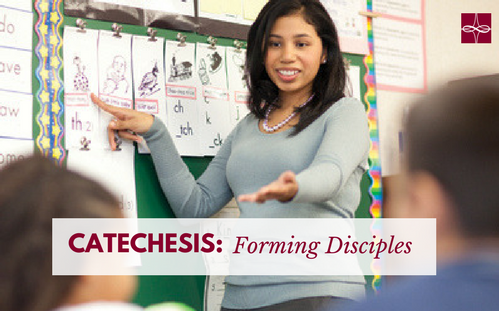



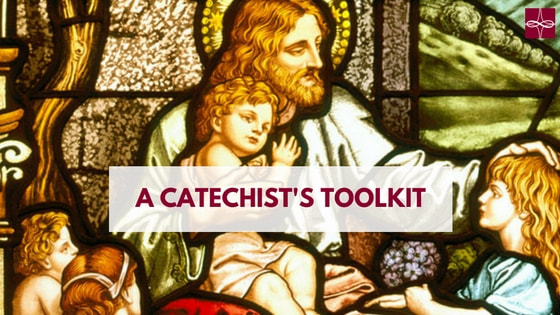

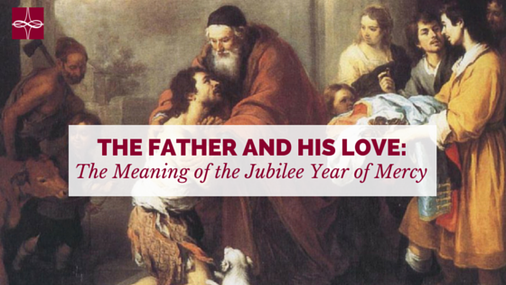

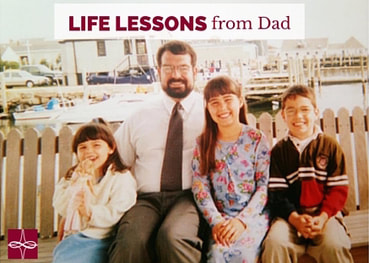

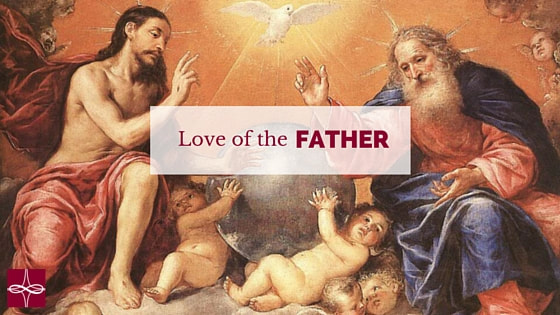

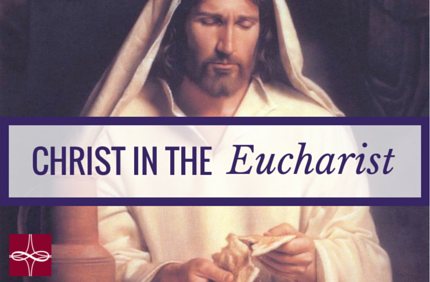





 RSS Feed
RSS Feed